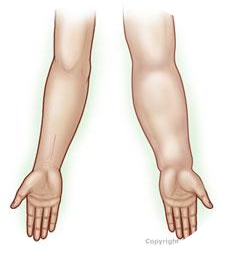Lymphedema refers to the swelling of tissue caused by the build-up of lymph fluid in specific parts of your body. Lymphedema is frequently diagnosed in the arms and legs, but often occurs in the chest walls, neck, abdomen / trunk and genital areas.
Your lymphatic system is crucial to maintaining a healthy body. It continually circulates lymph fluid throughout your body while collecting bacteria, viruses, and related waste products. The lymphatic system then carries this fluid, together with these collected, harmful substances, to your lymph nodes through the system’s lymph vessels. Upon reaching the lymph nodes, the wastes are filtered out and ultimately flushed from your body.
Lymphedema occurs when your lymph nodes and vessels are unable to adequately filter the lymph fluid. Think about it this way; lymph nodes act like the “drain” in your sink; if collected fluid becomes clogged and cannot be filtered there is a problem. When this happens, swelling in arm, leg, chest, neck, abdomen / trunk, and genital areas can occur.
Lymphedema often occurs after breast cancer surgery. It can happen at any time, immediately after or even ten or more years after surgery. TCP compression pumps are designed for and quite effectively treat this condition in the privacy and comfort of your home.




